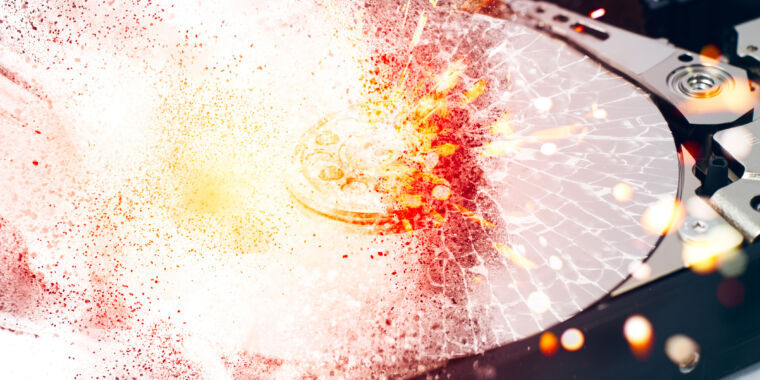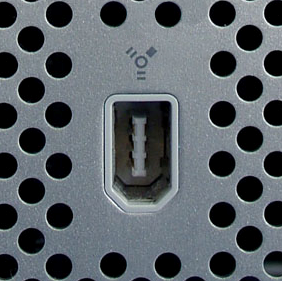My father told me he wanted to make USB flash drives of all the scanned and digitized family photos and other assorted letters and mementos. He planned to distribute them to all family members hoping that at least one set would survive. When I explained that they ought to be recipes to new media every N number of years or risk deteriorating or becoming unreadable (like a floppy disk when you have no floppy drive), he was genuinely shocked. He lost interest in the project that he’d thought was so bullet proof.
I explained that they ought to be recipes to new media every N number of years or risk deteriorating or becoming unreadable
This is important, and for some media, it should be more often than that.
People forget that flash memory uses electrical charge to store data. It’s not durable. If left unpowered for too long, that data will get corrupted. A failure might not even be visible without examining every bit of every file.
Keep backups. Include recovery data (e.g. PAR2). Store them on multiple media. Keep them well-maintained (e.g. give flash drives power). Mind their environment. Copy them to new storage devices before the old ones become obsolete.
It’s funny that with all our technology, paper is still the most durable storage medium (under normal conditions) that doesn’t cost an arm and a leg.
It’s funny that with all our technology, paper is still the most durable storage medium (under normal conditions) that doesn’t cost an arm and a leg.
Sophistication often creates fragility. The human mind marvels at sophistication naturally; appreciation for resilience usually only comes after that fragile thing has broken. Of course it’s too late by then.
All them young whipper snappers will continue to learn these life lessons the hard way, it seems.
If I had a cent every time an artist on patron had their computer die on them and lost works in progress or all their old stuff… I’d afford a few coffees.
Maybe you should have asked for a dollar everytime that happened. Youd be rich I tell ya!
Tape backups, baby.
No, I don’t have a library of those. I don’t even have a tape drive.
This is my next step, i just wish tape drives werent so expensive.
People forget that flash memory uses electrical charge to store data. It’s not durable. If left unpowered for too long, that data will get corrupted.
Yeah, but the link in the article, strict checks and no data loss over 52 weeks. Not neccessarily in USB sticks though. And sure, backups.
That number is a single manufacturer’s performance target. It is not a guarantee of results. You might be able to get Intel to replace an SSD if it corrupts data in under 52 weeks (assuming you notice it) but your data will still be gone.
Hardware performance can and does vary by manufacturer, model, and production run. Even the nominally identical cores within a single CPU have slightly different operating limits. YMMV.
Note also: the 52 week target you quoted is halved for every 5° rise in temperature.
This is where “piracy” is actually the industry’s saving grace. Decades or centuries later, will record labels exist and be well-managed (and flush with cash) enough to preserve archival copies of their artists catalogs? Probably not.
Will obscure weirdos exist all around the world on Usenet, IRC, or seeding torrents? Possibly.
What is really being discussed here is archiving of master recordings and session files. The publically avaliable releases themselves aren’t really in jeopardy. Orthough piracy probably does provide an extra layer of security to more obscure releases.
I thought I read somewhere that when they were making one of the Toy Story movies, there was some catastrophic data loss that nearly tanked the whole production. But then one of the animators came back from maternity and said wait, I think I have most of it synced to my home server? And the next thing you know, John Lasseter himself is barrelling down the highway to her place and it turned out yeah, she did have it.
The value of distributed redundancy
Something to be said for the wfh movement too.
Oh, fuck. Prince’s Vault… God I hope the estate has a plan to preserve all of that…
Many films and tv programs survive only thanks to a total stranger keeping their own copy. For a long term survival of any media it has to be copied and distributed far and wide.
There is no “write and forget” solution. There never has been.
Do you think we have ORIGINALS or Greek or roman written texts? No, we have only those that have been copied over and over in the course of the centuries. Historians knows too well. And 90% of anything ever written by humans in all history has been lost, all that was written on more durable media than ours.
The future will hold only those memories of us that our descendants will take the time to copy over and over. Nothing that we will do today to preserve our media will last 1000 years in any case.
(Will we as a specie survive 1000 more years?)
Still, it our duty to preserve for the future as much as we can. If today’s historians are any guide, the most important bits will be those less valuable today: the ones nobody will care to actually preserve.
Citing Alessandro Barbero, a top notch Italian current historian, he would kill no know what a common passant had for breakfast in the tenth century. We know nothing about that, while we know a tiny little more about kings.
deleted by creator
There is: mdiscs. Allegedly 1000 years durability even in Blu-ray format. Should be good enough for most important things. The best tapes AFAIK 30- 100 years
Problem is how to read the disk, especially after generations. Will they retain the knowledge to build and operate a device for this?
That’s always problem for any type of media. Including the tape which keep changing generations and only few recent are supported for reading. I still have blue ray reader / writer though
It’s even the case for physical media, like paper and carved stone, because over a long enough time people forget the language that they were written in. Historians had to teach themselves how to read ancient egyptian, and off the top i think a lot of Maya inscriptions are still a mystery.
Simple, we wrrie down the information on how to read the discs!
I wish there was a cheap and millennia-long lasting microfilm you could transfer books to. A projector is a pretty simple device to operate. Hmm that reminds me of “Last Words (2020)”.
Microfilms used to be sold as having a life expectancy of up 500 years. But in my experience they were a pain to use and the machines costly to maintain. The films would tear regularly too. Also the quality of the recorded image could be very poor sometimes.
DNA storage.
Citing Alessandro Barbero
Updoot just for this
But we do have originals of many other texts. Like vast, vast amounts of cuneiform texts because they were usually pressed into a clay tablet and then baked.
All but four Mayan paper codices were burned, but the Mayans loved carving their stories into rocks and making those rocks part of their cities’ architecture, so we still have a lot of their textual information. Same with the Egyptians- they wrote a lot on papyrus, and most of that is lost, but they also carved and painted all over tombs.
The secret is not to keep copying the texts. That introduces errors and those errors can compound. The secret is to preserve the texts in a medium which will only degrade over exceptionally long periods of time (compared to a human life, anyway).
If you had a device which could carve stored data into stone and make it retrievable again, you could potentially preserve that data for thousands of years.
Sad little human. I have written my treatises into the warp and weft of reality itself. I have twisted my curiosity into the folds of your DNA and stamped my waxing madness into the ragged edges of the telomeres that mark your days as numbered. I have made of the stars a celestial QR code that burns across the skies of every planet, that burns across the eyes of every ape who stares into the night and asks “why?”. I announced The Work with a bang of gas and light and awe and set time itself into motion so my scripture could expand eternally into the infinite, benighted expanse.
Is this from something?
Sounds like an HFY prompt
Im really hoping, waiting, for a good dense long-term storage medium. It doesn’t have to be fast, but large, cheap, and durable. I want a way to backup my plex library, or even, daily backups of documents and project files, and I don’t want to think about them ever again.
It does has to be fast enough that you can transfer the files to a different disk within your lifetime.
Tape is cheap and durable if you store it properly. Except the tape drive is expensive af.
Microsoft is working on glass storage. A glass plate can last 10,000 years according to Microsoft. Hopefully that tech will get miniaturized and available to consumers within our lifetimes.
As a former audio engineer in the days where we still used it- tape can rot.
Check out Cerabyte its for deep archinval storage
Do optical disks degrade if protected from the elements? A stack of Blu-ray disks could store quite a bit.
deleted by creator
And for bigger data sets, the capacity isn’t there. And writable media is getting more rare. Probably because of the same reason.
Depends on the disk technologies.
CDs are prone to flaking, otherwise most disk are suspectible of oxidation (disk rot) if stored improperly. M-Disk is a long-life variant of both DVDs and Blu-Rays, although more expensive. However, write-once disks are very ransomware-resilient, and I recommend to add a write-once media to any proper backup setup.
M-Disk is rated to last like
1001000 years. They are also working on a 125 Terabyte CD. Optical storage is the way to go.Optical storage
so they’ve solved bitrot? nice
Well yeah but BluRay is still much more expensive and smaller capacity. Lets hope this new 125TB disk works out
The main cause of bitrot in older disks is the organic dyes fading (aside from REALLY cheap disks where delamination was a problem), whereas M-Disc uses an inorganic carbon material
TIL, thanks!
Was it sapphire or something? But one and done. I wonder if you could just keep writing and just “cross-out” the old stuff with that kind of capacity.
Not sure what sapphire means, but here is the article. Just appending records and differential backups would seem to be the way to go.
the new optical disks are claimed to be “highly stable so there are no special storage requirements.” The researchers tout an expected shelf life of 50 to 100 years
Sapphire was one of the materials being researched for optical data storage, once upon a time.
“Chinese researchers …”
OK.
M-Disc is rated to last 1000 years.
It certainly would make planning the dang home lab easier. Im in a small place! I don’t have room for all the stuff i wanna play with!
Punch cards? Stored correctly there’s no reason they couldn’t last many human lifetimes. But… Yeah it’ll take a while to encode everything.
I would have thought that with modern technology we could come up with something like punch cards but more space/time efficient. Physical storage of data - only one write cycle of course, but extremely durable. Even just the same system as punch cards but using tiny, tiny holes very close together on a roll of paper. Could be punched or read by a machine at high speed (compared to a regular punch card, presumably still Ber slow compared to flash media).
deleted by creator
Yes that’s what I’m thinking, some modernised physical data storage technique.
I think you’re looking for stone tablets.
Archive discs are that but not exactly cheap.
deleted by creator
To me, this is just another story of the music industry’s technical incompetence.
Even in the 1990s, everyone would have known that hard drives were not a long-term archival storage solution. This is like crumpling up a piece of paper, tossing it in the corner, then being upset decades later when your “archival solution” had issues.
The piece of paper is basically much more likely to survive in a corner barring a fire. I have crumpled pieces of paper from 20 years ago. My PATA hard drive… I don’t even have a computer with that connector
A bunch of paper tossed into a corner could get wet, mouldy, get munched on by rats, etc. But, I know what you mean. Spinning plates full of magnetized bits with a connector technology that only lasts a decade at most is hardly going to be reliable, even if stored under ideal conditions.
deleted by creator
I’m sure they considered anyone telling them they needed to spend money to be a pain in the ass the same way companies don’t follow the recommendations of their IT departments.
The problem isn’t even the hard drives, it’s how they are managing them. There’s not many digital data storage solutions around that you can dump into a closet for a few decades and then still read.
You have to regularly test your hard drives, so that when one fails you can take your other copy of the data and put it on a new drive.
It’s not a bad start though, and how hard would it be for the people who have surviving copies to copy it to “the next best new thing” in 10 years? The problem is of course that sequence would need to be continued on, like a tradition, which is doable as well.
Honestly in a use case like family photos, redoing it every x amount of time is probably a good idea anyway so new ones can be added.
how music is so complicated to archive now
??
That’s why I back up my data on stone tablets in Cunieform.
Seriously though, if you wanted data to last for centuries, what would be your best bet? Would it be some sort of 3D-printed mechanical storage? At least plastics are generally not biodegradable, though they are photodegradable, so I guess you’d want to stick your archive in a dry cave somewhere?
Or what about this idea of encoding the data in the DNA of some microbe and cutting it loose? What could possibly go wrong?
Archival grade m-discs, apparently. I had the same question. https://www.howtogeek.com/858426/whats-the-best-way-to-store-data-for-decades-or-centuries/
It’s a shame their capacity lags so far behind current hard drives. And not many drives for these discs are still made, so what are the chances of them becoming unreadable just because no one has equipment to read them?
Cool! I can see how optical media could, in theory, be very long-lasting as long as you don’t use materials that oxidize or otherwise degrade over time.
Please stop that, DNA is good for mutations, not for long-term consistency.
Well I guess I’m picturing DNA encoding like a RAID billion in terms of redundancy, so with some checksumming, you ought be able to sort out any mutations? But I’m no geneticist.
There’s also that pesky low r/w bitrate.
Magnetic tape?
Magnetic tape only lasts for a decade or two.
OK, punch tape it is then.
It’s baffling, you can do a lot of tasks with a compact version of PDP-11 (there were two Soviet clones, I don’t remember which of them is which - one was a proper one, and could be used as a terminal server too, another had the monitor board simplified, IIRC, making it more of a normal PC of that time, just with PDP-11 CSA and the OS was RTX-11 in essence, but reverse-engineered and localized and with hardware drivers for those machines).
(I know it’s a different period and they had floppies.)
Why do we need such enormously complex fragile things? We rely on them so much that if, say, a “global thermonuclear war” really happens, with following hunger, movements of population, rapid climate changes, - our civilization is profoundly fucked.
Paper tape would probably work, as long as you could find a reliable reader for it. I’m actually old enough to have used it and the readers often had problems. Getting rid of the mechanical aspects of the reader and replacing them with light sensors would go a long way toward fixing that.
Paper doesn’t last, is hard to store, and the information density is miserable.
I got four HDDs, some are almost 10 years old. They work great but I know that won’t be for forever.
I have probably lost lots of pictures die to head crash. WD especially
I only lost two HDDs in my life. Both in 2009. And yes, they were WDs
The only one that didn’t die because of my own fault (two externals and a laptop one sigh), was one of the infamous IBM/Hitachi Deathstars.
Buy Spinrite. It’s not perfect but it’s the best thing available for drive maintenance and recovery. I have used it for over 10 years. If the drive is dying it’ll take forever, but I’ve recovered data that was nearly gone due to sector loss. It goes down to the bit level BTW. Someday Steve will release v7 … someday.
This is the first time I’ve seen anyone else talk about SpinRite, known about it a long time too
In my life I’ve had several HDD’s and SSD’s fail on me. None of that shit lasts forever and you would honestly be surprised how often they fail. For huge servers like data centers the average failure rate is between 1% and 2% per year, and sometimes even higher. They literally have to replace hard drives on a daily basis because of failure.
Disk failure is one of the reasons I have copies of all of my important stuff saved to every hard drive on my computer, along with an external just in case. One time my system drive failed and I couldn’t save anything because my operating system stopped working. Had to reinstall the OS and do a data recovery. Ended up with a bunch of photos that were corrupted, distorted, or missing half the photo.
I just replaced a drive today that has been running 24/7 for the last 5.18 years. It hadn’t failed yet but was in a predictive failure state due to the amount of bad sectors it has accumulated. 3 other disks in the same giant raid array are showing some bad sectors but not enough to be over the ‘replace me now’ threshold.
My system is to duplicate to fresh media once in a while. It’s more hands on, but it’s the only option I have. My NAS will be cloned to new drives in the next few years.
That’s the way to do it. Just keep bringing data forward even for media that sits in a drawer.
You might want to look at snapraid. I’ve recently overhauled my own NAS and love it. It is snapshot based (so not perfect safety) but it is highly configurable and provides parity and scrubbing for corruption even with a JBOD array.
I’ll check that out. Thanks.
I have a feeling USB drives will be readable for a long time to come, considering that we still use the standard almoat everywhere, nearly 28 years after its introduction.
That said, copying the data from old archives into new formats is always a good idea
Edit: I was envisioning actual external hard disk or solid state drives accessible using a USB connection. Thumb drives and other ultra-portable data formats are notorious for poor data integrity over time.
Note though that usb Sticks (if you mean that with USB drives) usually get the worst, cheapest quality flash. It’s a lottery, and expect nothing in no-name sticks.
* quality in yield, ssd > sd-card/emmc > flash sticks
I’ve got several flash drives from 2 different brands that are less than 3 years old that are already dying. SanDisk and Lexar, both large brands and they’re already losing reliability. Real shame that the older stuff works longer. I really only need them for making Linux bootable drives and they struggle with that.
These people haven’t heard of zfs then?
Zfs is just software raid, not an archival /backup solution. Sure, you can hold data on a zfs array for long term, but not without active maintenance (powering the drives periodically, replacing old drives, doing some kind of data refresh / scrubbing) and backups.
I still have a dvdr and good quality discs stored properly can last decades. Not perfect and harder and harder to find readers, but for long term backups its an affordable solution.
My family data vault has three dvdrs still in the box just in case 40 years from now you can’t find a drive.
That said, we will probably be moved beyond SATA then so…















